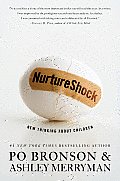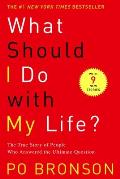
If, a few years ago, anyone had told us, "You really ought to read this book about the new science of kids," we would have politely thanked him and then completely ignored his recommendation. Neither of us (Po is a father of two small kids; Ashley tutors school children) went around saying, "Wow, I really need to brush up on the science of child development, because I'm messing up."
According to lore, the maternal instinct is innate. Women are assured it doesn't matter if they spent their twenties avoiding babies, or if they don't consider themselves very maternal. The moment after birth, when the baby's first handed to his mother, maternal instincts magically kick in, right along with the hormones. As a mother, you will know what to do, and you will continue to know for the next 18 years. This fountain of knowledge is supposed to come as part of a matched set of ovaries and a desire to wear expensive high heels.
Thanks to this mythos, society uses the word "instinct" to convey the collective wisdom gleamed intuitively from our experiences raising kids. But this is an overgeneralization of the term. Really, the actual instinct — the biological drive that kicks in — is the fierce impulse to nurture and protect one's child. Neuroscientists have even located exactly the neural network in the brain where this impulse fires. Expecting parents can rely on this impulse kicking in — but as for how best to nurture, they have to figure it out.
Today, with three years of investigation behind us, we now see that what we imagined were our "instincts" were instead just intelligent, informed reactions. Things we had figured out. Along the way, we also discovered that those reactions were polluted by a hodgepodge of wishful thinking, moralistic biases, contagious fads, personal history, and old (disproven) psychology — all at the expense of common sense.
 "Nurture shock," as it is generally used, refers to the panic — common among new parents — that the mythical fountain of knowledge is not magically kicking in at all.
"Nurture shock," as it is generally used, refers to the panic — common among new parents — that the mythical fountain of knowledge is not magically kicking in at all.
This book will deliver a similar shock — it will use the fascinating new science of children to reveal just how many of our bedrock assumptions about kids can no longer be counted upon.
The central premise of our book is that many of modern society's strategies for nurturing children are in fact backfiring — because key twists in the science have been overlooked.
The resulting errant assumptions about child development have distorted parenting habits, school programs, and social policies. They affect how we think about kids, and thus how we interpret child behavior and communicate with the young. The intent of this book is not to be alarmist, but to teach us to think differently — more deeply and clearly — about children.
The topics covered in this book are wide-ranging, devoted to equal parts brain fiber and moral fiber. They relate to children of every age, from tots to teens. It could not be further from a paint-by-numbers approach. Specifically, we have chapters devoted to confidence, sleep, lying, racial attitudes, intelligence, sibling conflict, teen rebellion, self-control, aggression, gratitude, and the acquisition of language. The prose throughout is our mutual collaboration.
Along the way, we will push you to rethink many sacred cows — too many to fully list here, but some highlights include the following: self esteem, Noam Chomsky, Drivers' Ed, the idea that children are naturally blind to racial constructs, emotional intelligence, warning kids not to tattle, educational cartoons, the early identification of the gifted, the notion that television is making kids fat, and the presumption that it's necessarily a good sign if a child can say "no" to peer pressure.
We chose these topics because the research surprised us — it directly challenged the conventional point of view on how kids grow up.
However, once we parsed through the science and reviewed the evidence, the new thinking about children felt self-evident and logical, even obvious. It did not feel like we had to raise children "by the book." It felt entirely natural, a restoration of common sense. The old assumptions we once had seemed to be nothing but a projection of wishful thinking. Once we overcame the initial shock, we found ourselves plugged into children in a whole new way.